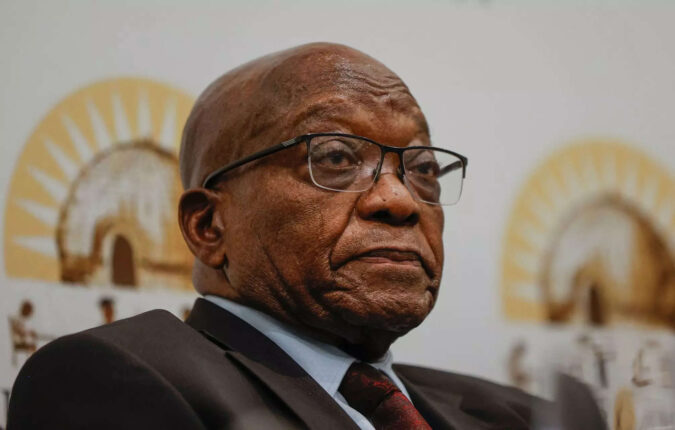In the latest twist arising from a sentence for contempt of court, Zuma was ordered to report back to jail, arriving at 6:00 am (0400 GMT) at a detention facility in the eastern town of Estcourt, the prison service said.
There, he was “admitted into the system” — only to be let go in just over an hour, under a “remission process” to ease overcrowding in prison, according to the national commissioner of correctional services, Makgothi Thobakgale.
“Upon admission into the system he was subjected to administrative processes… He was then released,” Thobakgale told a press conference in Pretoria.
Zuma, 81, was sentenced to 15 months in June 2021 after refusing to testify before a panel probing financial corruption and cronyism under his presidency.
He started serving his term in July 2021, sparking protests that descended into riots and looting that left more than 350 dead in the worst violence to hit South Africa since the advent of democracy.
But after just two months he was freed on medical parole for an undisclosed condition.
In November last year an appeals court found the release was illegally granted and ordered Zuma back to the Estcourt Correctional Centre in KwaZulu-Natal province.
South Africa’s prison service, which had granted Zuma’s conditional release, appealed the decision, but the bid was dismissed by the Constitutional Court last month.
Thobakgale said the ex-president had been ordered to return to jail on Friday in compliance with the ruling.
But Zuma immediately benefited from a remission of non-violent offenders approved by President Cyril Ramaphosa, Justice Minister Ronald Lamola said.
Mzwanele Manyi, a spokesman for Zuma’s foundation said the ex-president was “at home” and consulting with his legal team.
The decision was met with outrage by some opposition parties and scepticism from the press, with Thobakgale and Lamola facing a barrage of questions over the timing of the remission process, which began on Friday.
Lamola said the “exercise of exploring special remission” started in April, and more than 24,000 inmates, about two-thirds of them currently under correctional supervision and parole, would be released under the process.
The move “will alleviate overcrowding” which “poses a direct threat to inmate health, security, and management, and it could lead to a surge in gangsterism,” the minister said.
The Democratic Alliance (DA), South Africa’s leading opposition party, said it would seek legal action, adding Zuma’s release was a “monumental insult to each and every South African.”
“This decision has nothing to do (with) overcrowding, and everything to do with preventing Zuma from facing accountability for his actions,” said Glynnis Breytenbach, the DA’s shadow justice minister.
“The precedent has been clearly set. If you are a senior ANC member, you will never be held accountable for your crimes”.
Zuma is a senior member of the ruling African National Congress (ANC), in power since the end of white-minority rule in 1994.
He served as president from 2009 to 2018 before being forced out over graft allegations.
But as one of the dwindling generation of ANC anti-apartheid fighters, he remains deeply popular with many grassroots members.
The party is in the doldrums as it seeks to continue its reign in government as elections loom next year.
Polls suggest the ANC could see its vote drop below 50 percent, battered by discontent at corruption, power cuts and entrenched unemployment.
Besides his 2021 contempt-of-court conviction, Zuma is facing separate charges of corruption in an arms procurement scandal dating to the late 1990s, when he was vice president.
